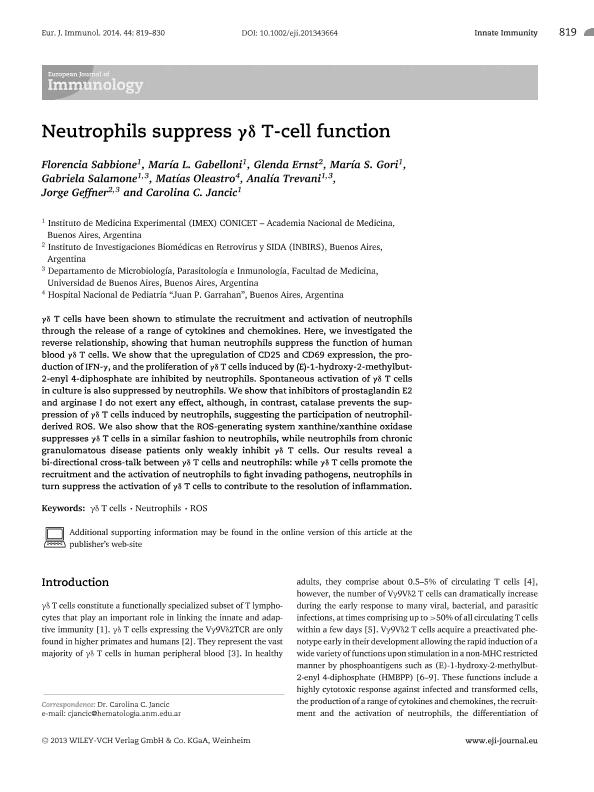Artículo
Neutrophils suppress γδ T-cell function
Sabbione, Florencia ; Gabelloni, María Laura
; Gabelloni, María Laura ; Ernst, Glenda
; Ernst, Glenda ; Gori, María Soledad
; Gori, María Soledad ; Salamone, Gabriela Veronica
; Salamone, Gabriela Veronica ; Oleastro, Matías; Trevani, Analía Silvina
; Oleastro, Matías; Trevani, Analía Silvina ; Geffner, Jorge Raúl
; Geffner, Jorge Raúl ; Jancic, Carolina Cristina
; Jancic, Carolina Cristina
 ; Gabelloni, María Laura
; Gabelloni, María Laura ; Ernst, Glenda
; Ernst, Glenda ; Gori, María Soledad
; Gori, María Soledad ; Salamone, Gabriela Veronica
; Salamone, Gabriela Veronica ; Oleastro, Matías; Trevani, Analía Silvina
; Oleastro, Matías; Trevani, Analía Silvina ; Geffner, Jorge Raúl
; Geffner, Jorge Raúl ; Jancic, Carolina Cristina
; Jancic, Carolina Cristina
Fecha de publicación:
12/2013
Editorial:
Wiley VCH Verlag
Revista:
European Journal of Immunology
ISSN:
0014-2980
Idioma:
Inglés
Tipo de recurso:
Artículo publicado
Clasificación temática:
Resumen
γδ T cells have been shown to stimulate the recruitment and activation of neutrophils through the release of a range of cytokines and chemokines. Here, we investigated the reverse relationship, showing that human neutrophils suppress the function of human blood γδ T cells. We show that the upregulation of CD25 and CD69 expression, the production of IFN-γ, and the proliferation of γδ T cells induced by (E)-1-hydroxy-2-methylbut-2-enyl 4-diphosphate are inhibited by neutrophils. Spontaneous activation of γδ T cells in culture is also suppressed by neutrophils. We show that inhibitors of prostaglandin E2 and arginase I do not exert any effect, although, in contrast, catalase prevents the suppression of γδ T cells induced by neutrophils, suggesting the participation of neutrophil-derived ROS. We also show that the ROS-generating system xanthine/xanthine oxidase suppresses γδ T cells in a similar fashion to neutrophils, while neutrophils from chronic granulomatous disease patients only weakly inhibit γδ T cells. Our results reveal a bi-directional cross-talk between γδ T cells and neutrophils: while γδ T cells promote the recruitment and the activation of neutrophils to fight invading pathogens, neutrophils in turn suppress the activation of γδ T cells to contribute to the resolution of inflammation.
Palabras clave:
Ros
,
Neutrophils
,
Γδ T Cells
Archivos asociados
Licencia
Identificadores
Colecciones
Articulos(IMEX)
Articulos de INST.DE MEDICINA EXPERIMENTAL
Articulos de INST.DE MEDICINA EXPERIMENTAL
Articulos(INBIRS)
Articulos de INSTITUTO DE INVESTIGACIONES BIOMEDICAS EN RETROVIRUS Y SIDA
Articulos de INSTITUTO DE INVESTIGACIONES BIOMEDICAS EN RETROVIRUS Y SIDA
Citación
Sabbione, Florencia; Gabelloni, María Laura; Ernst, Glenda; Gori, María Soledad; Salamone, Gabriela Veronica; et al.; Neutrophils suppress γδ T-cell function; Wiley VCH Verlag; European Journal of Immunology; 44; 3; 12-2013; 819-830
Compartir
Altmétricas



